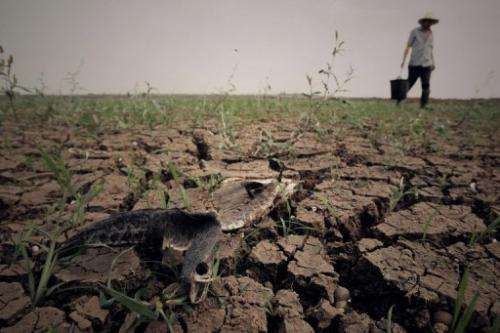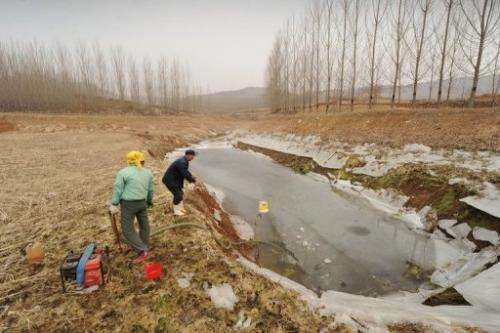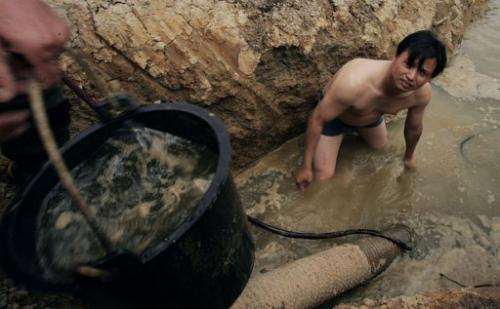Central China drought worst in over 50 years: reports

Central China's worst drought in more than 50 years is drying reservoirs, stalling rice planting, and threatens crippling power shortages as hydroelectric output slows, state media said Wednesday.
Rainfall levels from January to April in the drainage basin of the Yangtze, China's longest and most economically important river, have been 40 percent lower than average levels of the past 50 years, the China Daily said.
The national flood and drought control authority has ordered the Three Gorges Dam, the world's largest hydroelectric project, to increase its discharge of water by 10 to 20 percent for the next two weeks.
The measure is aimed at sending badly needed water to the Yangtze's middle and lower reaches for drinking and irrigation.
Water-marks in more than 1,300 reservoirs in Hubei province, where the dam is located, have dropped below allowable discharge levels for irrigation, the paper quoted Yuan Junguang, Hubei's reservoir management director, as saying.
Rainfall in some areas is as much as 80 percent lower than usual while the provinces of Anhui, Jiangsu, Hubei, Hunan, Jiangxi and Zhejiang along with Shanghai municipality are mired in their worst droughts since 1954.
"Without adequate water, we lost the spring planting season for rice," Hubei farmer Zhou Xingtao was quoted as saying.
It said many other farmers in Hubei have lost their existing crops or given up on planting summer rice, fearing the emergency water supplies will be inadequate to sustain their fields, with more hot and dry weather forecast.
The agricultural impact is likely to further alarm officials already trying to tame high prices of key items such as food.

China -- and the Yangtze river region in particular -- is prone to the alternating threats of crippling drought followed by devastating flooding.
Just last summer, sustained torrential rainfall across the region caused widespread flooding and even some concern over whether the giant Three Gorges Dam would be able to contain the deluge.
More than 3,000 people were reported killed in the flooding and related landslides.
Nearly every year, some part of China suffers its worst drought in decades, and meteorological officials have said previously the extreme weather may be due to climate change.
The State Grid, China's state-owned power distributor, reportedly said this week that 10 of its provincial-level power grids were suffering severe shortages due to the drought's impact on hydroelectric generation, including Shanghai and the heavily populated southwestern Chongqing region.
China could face a summer electricity shortage of 30 gigawatts -- the most severe power shortfall since 2004, the company said.
The drought also is posing a threat to the Yangtze basin's highly-endangered population of freshwater dolphins, as water levels have plunged as much as three metres (10 feet) in key dolphin areas, raising the risk of stranding the animals.

There are an estimated 1,000 of the dolphins -- fewer than the giant panda -- and that number is falling due to pollution and other environmental woes.
China last week said the Three Gorges Dam has caused a host of ills that must be "urgently" addressed, in a rare admission of problems in a project it has long praised as a world wonder.
The State Council, or cabinet, acknowledged problems with water pollution, relocation of area residents, and seismological risks from the huge reservoir behind it.
(c) 2011 AFP



















